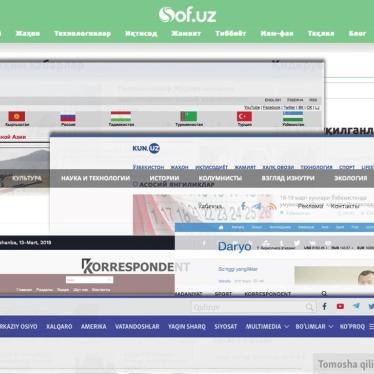Dear President Barroso,
We are writing to urge you to use your upcoming meeting with President Karimov to mark the EU's profound concern about the state of human rights in Uzbekistan, and to press for concrete improvements.
Hosting Uzbekistan's president comes with a duty to speak out about the government's atrocious human rights record. It is imperative that the EU sends a clear and coherent message to Uzbekistan's leadership about the centrality of human rights in its engagement with the country. In particular, we look to you to reaffirm the specific human rights demands the EU has formulated for Uzbekistan, and make clear - as the Foreign Affairs Council Conclusions of October 2010 did - that their fulfillment is necessary for enhanced relations.
The human rights criteria formulated by the Foreign Affairs Council for Uzbekistan are as follows:
- Release all imprisoned human rights defenders and prisoners of conscience;
- Allow unimpeded operation of nongovernmental organizations (NGOs) in the country;
- Cooperate fully with all relevant UN Special Rapporteurs;
- Guarantee freedom of speech and of the media;
- Proceed with the practical implementation of the conventions against child labor;
- Fully align its election processes with international standards.
As you know, the Uzbek government has persisted in its defiance of the EU's calls for human rights improvements. It continues to crack down on civil society activists, to clamp down on media freedoms, and to suppress religious worship. More than a dozen human rights defenders remain behind bars for no other reason than their legitimate human rights work. They are: Solijon Abdurakhmanov, Azam Formonov, Nosim Isakov, Gaibullo Jalilov, Alisher Karamatov, Jamshid Karimov, Norboi Kholjigitov, Abdurasul Khudainasarov, Ganihon Mamatkhanov, Habibulla Okpulatov, Yuldash Rasulov, Dilmurod Saidov, and Akzam Turgunov. A number of other activists, such as dissident poet Yusuf Jumaev, likewise remain imprisoned on politically-motivated charges, and numerous others have faced threats and criminal prosecution on account of their peaceful activism.
Torture and ill-treatment remain rampant with the much-hailed habeas corpus reform falling far short of international standards. Government-sponsored forced child labor in the cotton sector continued through the fall 2010 harvest, while the government blocked the International Labour Organization from sending independent observers. The government also continues to refuse access to all eight UN special procedures that have requested invitations, and to obstruct the work of domestic and international NGOs, including Human Rights Watch, in the country.
Indeed, President Karimov's visit marks exactly one month since the Uzbek government denied work accreditation to Human Rights Watch's representative in Tashkent, effectively making it impossible for us to maintain an operational presence in the country.
President Karimov's visit also comes at a time of renewed EU engagement with Uzbekistan, including the prospective opening of an EU delegation in Tashkent. As it pursues this engagement with the Uzbek government, we urge the EU not to allow its quest for a presence to become a substitute for a serious and credible human rights policy.
The EU has repeatedly stated that upgraded relations will be linked to concrete and measurable progress on human rights. In its October 2010 conclusions, the Foreign Affairs Council reiterated that "the depth and quality of the cooperation and dialogue at all levels [between Tashkent and the EU] continue to depend on Uzbek reforms and progress in the areas mentioned above." But Uzbekistan's consistent failure to make concrete, demonstrable progress with respect to any of the human rights criteria has yet to result in any known policy consequences.
President Karimov's visit provides a crucial opportunity for sending a strong message about the EU's commitment to securing the critical human rights improvements it has repeatedly called for. The persisting lack of progress by Tashkent in any key areas shows that a more robust human rights policy is needed.
We hope you will seize the opportunity of next week's meeting to set the record straight, making clear that the human rights criteria remain valid, and giving real meaning to the Foreign Affairs Council's pledge to make the EU's relationship with Uzbekistan directly dependant on the Uzbek government's fulfilling them. The Uzbek government's position as a strategic partner does not exempt it from responsibility for respecting human rights. The EU's strong stated commitment to these ideals makes it incumbent for it to press the Uzbek government to respect them as well.
Thank you for your attention to these concerns.
Sincerely,
Rachel Denber Acting Director Europe and Central Asia division
Lotte Leicht EU Director







